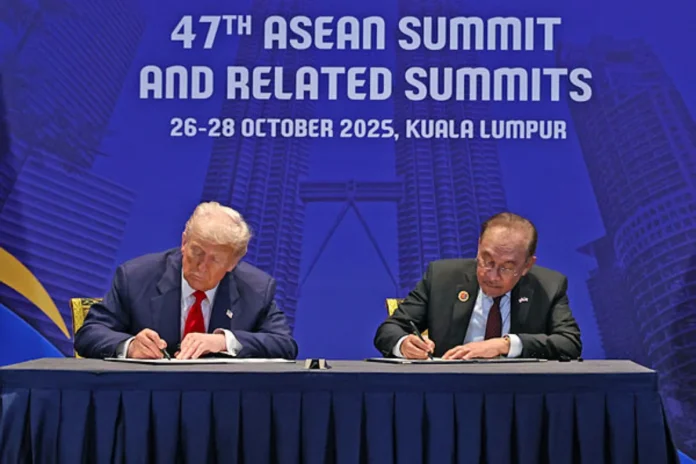MITI confirms Malaysia’s sovereignty and policy autonomy remain intact under ART, defending RM56.2 billion in semiconductor exports from US tariffs
KUALA LUMPUR: Malaysia’s sovereignty, policy autonomy and national interests remain fully protected under the Malaysia-United States Agreement on Reciprocal Trade (ART).
The Ministry of Investment, Trade and Industry (MITI) clarified that ART is not a conventional free trade agreement initiated by Malaysia.
“It is a measured response to defend national interests, protect jobs and maintain the country’s export market against the unilateral tariffs imposed by the US on Malaysia and many other trading partners,” MITI stated.
“No amendments to Malaysian laws were required as a precondition to signing — which affirms our sovereignty in the whole negotiation process.”
Without ART, Malaysian exports could have faced tariffs of 24%, 25% or higher, potentially impacting RM56.2 billion in semiconductor exports alone.
This adverse outcome would have jeopardised thousands of businesses and millions of livelihoods across electrical and electronics, aerospace, rubber, cocoa and pharmaceuticals sectors.
Malaysia-US trade reached RM325 billion in 2024, with exports comprising RM198.65 billion.
From January to September 2025, Malaysia’s exports to the US totalled RM166.38 billion, making the US effectively Malaysia’s largest export market.
Through ART, Malaysia secured a reduced reciprocal tariff rate of 19%, the lowest applied to most ASEAN countries with a trade surplus with the US.
Malaysia obtained exemptions for 1,711 tariff lines, safeguarding approximately RM22 billion in exports covering palm oil, rubber, cocoa, aerospace parts and pharmaceuticals.
This exemption holds strong potential for future growth beyond RM22 billion in export value.
Malaysia maintains, on average, 7% import duties against US goods and continues to protect sensitive sectors.
At least 10 engagement sessions with policymakers have been organised since May 2025, including briefings for the Backbenchers Club and a special Parliamentary Sitting.
The ART was presented to and approved by the Cabinet following comprehensive consultations.
Engagement sessions involved multiple ministries including Finance, Foreign Affairs, Agriculture and Food Security, Plantation Industries and Commodities, and Health.
Consulted agencies included the Attorney-General’s Chambers, Bank Negara Malaysia, JAKIM, Department of Veterinary Services, National Pharmaceutical Regulatory Agency and Royal Malaysian Customs Department.
The government maintained clear red lines on Bumiputera policies, government procurement, and ownership in strategic sectors like energy and telecommunications.
No ART clauses override these red lines, with provisions explicitly anchored in Malaysia’s domestic laws.
“Malaysia retains full autonomy to decide its course of action, consistent with its longstanding neutral and non-aligned foreign policy,” MITI emphasised.
Articles 3.3 and 5.3 require consultations with the US but do not confer any veto power over Malaysia’s future trade agreements.
ART functions as a defensive, stabilising instrument mitigating the risk of sudden tariff shocks.
It secures better treatment than many peers facing the same US unilateral measures while upholding Malaysia’s sovereign right to regulate in the national interest.
Finalising ART reinforces Malaysia’s position as a resilient, predictable and trusted trading nation.
MITI welcomes genuine, fact-based discourse on sovereignty and other ART-related concerns.
The ministry will continue briefing Parliament, engaging stakeholders and providing clear explanations for public evaluation.
Implementation of ART will remain firmly grounded in Malaysia’s laws, national interest and independent foreign policy. – Bernama








